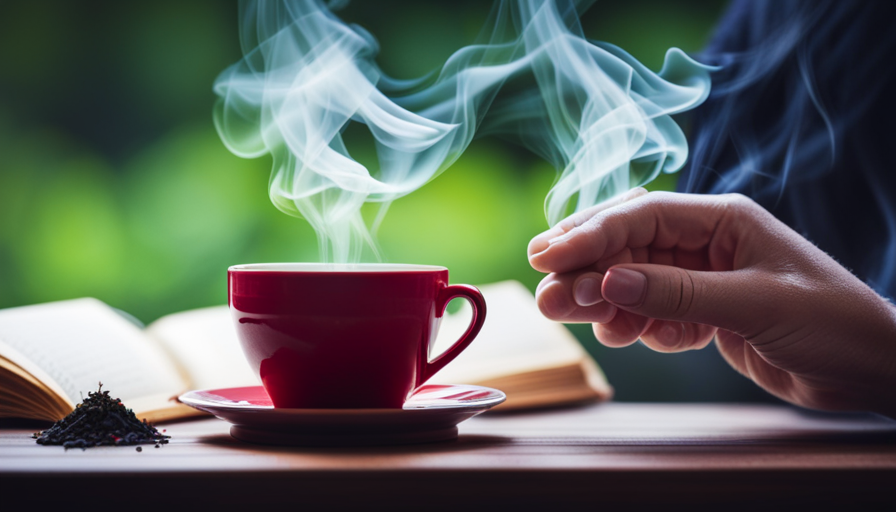Herbal tea, a wonderful natural elixir made from a variety of herbs, has always been admired for its incredible healing qualities. This magical infusion, infused with centuries of knowledge, provides numerous advantages that support our overall health – physical, mental, and emotional. Enjoying a hot cup of herbal tea is like setting off on a calming adventure, with each sip revealing a realm of holistic wellness.
From relieving digestive issues to boosting the immune system, herbal tea has been recognized for its remarkable ability to alleviate a wide range of ailments. This natural elixir promotes relaxation, aids in better sleep, and even helps alleviate cold and flu symptoms. It supports weight loss efforts, improves digestion and gut health, and reduces inflammation in the body.
Herbal tea has also been linked to supporting heart health, promoting mental clarity and focus, and providing a gentle yet effective way to navigate the complexities of modern life.
So, join me as we delve into the wonders of herbal tea, exploring its diverse range of benefits and uncovering the secrets that nature has bestowed upon us.
Let us embark on this journey of discovery, one sip at a time.
Key Takeaways
- Herbal tea helps with digestive issues such as stomach cramps and bloating.
- Herbal tea supports the immune system and protects against illnesses.
- Herbal tea promotes relaxation, better sleep, and a healthy immune system.
- Herbal tea supports respiratory health and weight loss.
Relieving Digestive Issues
If you’re experiencing digestive issues, herbal tea can help alleviate them. Easing stomach cramps and alleviating bloating are just a few of the benefits that herbal tea can provide for your digestive system.
When it comes to stomach cramps, certain herbal teas like peppermint, chamomile, and ginger have been shown to have antispasmodic properties, helping to relax the muscles in the gastrointestinal tract and relieve cramping.
Bloating, on the other hand, can be caused by excess gas in the digestive system. Herbal teas like fennel and dandelion root have diuretic properties, which can help to reduce water retention and alleviate bloating.
Moreover, herbal teas can also have a positive impact on your immune system. By incorporating immune-boosting herbs such as echinacea, elderberry, and ginger into your herbal tea, you can provide your body with the necessary nutrients and antioxidants to support a strong immune response. These herbs have been traditionally used for their immune-enhancing properties and can help to protect against common illnesses and infections.
Herbal tea is a natural and effective way to address digestive issues, including stomach cramps and bloating. Additionally, by incorporating immune-boosting herbs into your herbal tea routine, you can support your immune system and enhance your overall health.
Boosting the Immune System
To enhance your immune system, sipping on a warm cup of herbal infusion can work wonders for you. Herbal teas are packed with powerful antioxidants and natural compounds that can help boost your immune system, protecting your body against harmful pathogens and reducing the risk of infections. These teas can also increase your energy levels and improve your overall well-being.
Certain herbs, such as echinacea, elderberry, and ginger, have been shown to have immune-boosting properties. Echinacea can stimulate the production of white blood cells, which are crucial for fighting off infections. Elderberry is rich in antioxidants that can help reduce inflammation and support a healthy immune response. Ginger has antimicrobial properties and can help strengthen your immune system.
In addition to their immune-boosting effects, herbal teas can also promote relaxation and better sleep, which are essential for maintaining a healthy immune system. When you’re well-rested and relaxed, your body can effectively fight off infections and heal itself.
So, sip on a warm cup of herbal infusion to boost your immune system, while also promoting relaxation and better sleep.
Promoting Relaxation and Better Sleep
Sipping on a warm cup of herbal infusion can work wonders for your overall well-being, promoting relaxation and better sleep, allowing your body to effectively fight off infections and heal itself, all while providing a comforting embrace.
When it comes to relaxation techniques, herbal tea has long been used as a natural sleep aid. The soothing properties of certain herbs, such as chamomile, lavender, and valerian root, have been shown to calm the mind and relax the body, making it easier to unwind and drift off into a peaceful slumber.
Research has shown that the compounds found in herbal teas can help regulate our sleep-wake cycles, promoting a deeper and more restful sleep. These teas act as gentle sedatives, reducing anxiety and stress levels, which are often the main culprits behind sleep disturbances. By incorporating herbal tea into your bedtime routine, you can create a calming ritual that signals to your body that it’s time to relax and prepare for sleep.
In addition to promoting relaxation and better sleep, herbal tea can also help relieve cold and flu symptoms. Transitioning from relaxation to cold and flu relief, certain herbs like echinacea and elderberry have immune-boosting properties that can help alleviate symptoms and support the body’s natural defense mechanisms.
Relieving Cold and Flu Symptoms
When it comes to relieving cold and flu symptoms, herbal tea can be a valuable ally. It can soothe a sore throat and calm a cough, while also helping to clear congestion and sinus pressure. Additionally, herbal tea supports respiratory health, providing a natural way to boost your immune system and promote healing.
Soothing Sore Throat and Cough
Herbal tea is like a magical elixir that miraculously soothes even the most painful sore throats and coughs. It has been used for centuries as a natural remedy to alleviate throat irritation and reduce coughing frequency. The soothing properties of herbal tea come from its various components, such as antioxidants, anti-inflammatory compounds, and throat-coating substances. These work together to provide relief and promote healing. To illustrate the effectiveness of herbal tea in soothing sore throats and coughs, let’s take a look at the following table:
| Herbal Tea Ingredients | Benefits |
|---|---|
| Chamomile | Soothes throat |
| Ginger | Reduces inflammation |
| Honey | Relieves coughing |
By incorporating these ingredients into your tea, you can experience the soothing effects firsthand. As we move on to the next section about clearing congestion and sinus pressure, it’s important to note that herbal tea can provide relief for a wide range of respiratory symptoms.
Clearing Congestion and Sinus Pressure
To alleviate the discomfort of congestion and sinus pressure, indulge in a steaming cup of aromatic tea blended with healing ingredients. Herbal tea can be an effective remedy for clearing allergies and reducing sinus headaches.
Certain herbal teas, such as peppermint, chamomile, and ginger, have natural decongestant properties that can help to alleviate congestion and relieve sinus pressure. Peppermint tea, in particular, contains menthol, which can open up the nasal passages and promote easier breathing.
Ginger tea has anti-inflammatory properties that can reduce sinus inflammation and alleviate discomfort. Chamomile tea, on the other hand, can help to soothe irritated sinuses and provide relief from sinus-related headaches.
By incorporating these herbal teas into your daily routine, you can find relief from congestion and sinus pressure, supporting your overall respiratory health.
Supporting Respiratory Health
Breathe in the fresh, crisp air and feel your lungs expand as you take a moment to support your respiratory health. Herbal tea can be a great addition to your daily routine, especially if you suffer from respiratory allergies or infections. Here are three ways herbal tea can help:
-
Soothes respiratory allergies: Certain herbal teas, such as chamomile or peppermint, have anti-inflammatory properties that can help reduce the symptoms of respiratory allergies, like coughing and sneezing.
-
Fights respiratory infections: Herbal teas like ginger or echinacea are known for their immune-boosting properties, which can help strengthen your respiratory system and fight off infections.
-
Provides respiratory relief: Some herbal teas, like eucalyptus or thyme, have natural expectorant properties that can help clear mucus from your airways and provide relief from congestion and sinus pressure.
By incorporating herbal tea into your daily routine, you can support your respiratory health and experience the benefits it offers.
Next, let’s explore how herbal tea can aid in supporting weight loss without compromising your health.
Supporting Weight Loss
Boost your weight loss journey by incorporating herbal teas into your daily routine. When it comes to shedding those extra pounds, herbal teas can be a valuable tool. Not only do they offer a delicious and refreshing alternative to sugary beverages, but they also provide numerous benefits that can support your weight loss efforts.
One of the main advantages of herbal tea for weight loss is its ability to boost metabolism. Certain herbal teas, such as green tea and oolong tea, contain compounds that’ve been shown to increase fat oxidation and improve insulin sensitivity. Both of these can aid in weight loss.
Additionally, herbal teas can help reduce appetite and cravings, making it easier to stick to a healthy eating plan.
Another way herbal teas can support weight loss is by promoting hydration. Staying hydrated is essential for maintaining a healthy weight, as it helps regulate appetite, support digestion, and optimize metabolic function. By replacing sugary drinks with herbal teas, you can reduce your calorie intake and improve overall hydration.
In addition to their weight loss benefits, herbal teas also provide antioxidant benefits. These antioxidants help neutralize harmful free radicals in the body, which can reduce the risk of chronic diseases and support overall health.
Transitioning into the next section, herbal teas not only support weight loss and provide antioxidant benefits, but they also offer a range of other advantages that can contribute to your overall well-being.
Providing Antioxidant Benefits
When it comes to herbal tea, it not only aids in weight loss but also provides various other health benefits. One of the key benefits is its antioxidant properties, which can have a positive impact on our overall well-being.
Antioxidants are compounds that help protect our cells from damage caused by harmful free radicals. These free radicals are produced naturally in our bodies but can also be generated by external factors such as pollution, stress, and unhealthy diet choices. By consuming herbal tea with antioxidant properties, we can help neutralize these free radicals and reduce the risk of chronic diseases like heart disease, cancer, and neurodegenerative disorders.
Moreover, antioxidants are also known to support a healthy immune system and promote healthy skin. They can help reduce inflammation, improve blood circulation, and even slow down the aging process. So, by incorporating herbal tea into our daily routine, we can give our body an extra boost to stay healthy and vibrant.
As we move forward, let’s explore another incredible benefit of herbal tea – its ability to improve digestion and gut health.
Improving Digestion and Gut Health
Take a sip of this delightful elixir and let it work its magic on your digestive system, soothing any discomfort and ensuring smooth sailing for your gut. Herbal tea has long been recognized for its potential in improving digestion and promoting gut health. The natural compounds found in herbal teas can help improve gut flora, the collection of microorganisms that reside in our digestive tract and play a crucial role in our overall health.
One way herbal tea can enhance gut health is by promoting the growth of beneficial bacteria. Certain herbal teas, like chamomile and peppermint, have been found to have antimicrobial properties that can help balance the gut flora and reduce the growth of harmful bacteria. This can lead to better digestion and a healthier gut.
Additionally, herbal teas can also help reduce bloating, which is a common digestive issue. Ingredients like ginger and fennel in herbal teas have been traditionally used to alleviate bloating and support healthy digestion. These natural remedies can help ease discomfort and promote a flatter stomach.
Incorporating herbal tea into your daily routine can be a simple and effective way to support your digestive system and improve gut health. Soothe your gut and reduce bloating with a comforting cup of herbal tea. It’s a natural and holistic approach to nurturing your gut. In the next section, we will explore how herbal tea can also help reduce inflammation.
Reducing Inflammation
Incorporating herbal tea into your daily routine can be a simple and effective way to soothe your gut, support healthy digestion, and reduce inflammation. Herbal teas have been used for centuries to alleviate various health issues, and their natural compounds can provide numerous benefits for your body.
When it comes to reducing inflammation, certain herbal teas have been shown to be particularly effective. One way that herbal tea can help reduce inflammation is by reducing joint pain. Many herbal teas, such as ginger tea and turmeric tea, contain powerful anti-inflammatory properties that can help alleviate pain and discomfort in the joints. These teas work by blocking certain enzymes that contribute to inflammation, providing relief for those suffering from conditions such as arthritis.
In addition to reducing joint pain, herbal tea can also improve skin health. Some herbal teas, like chamomile tea and green tea, are rich in antioxidants that can help reduce redness, inflammation, and acne. These teas can also promote collagen production, leading to healthier, more radiant skin.
Incorporating herbal tea into your daily routine can have a positive impact on your overall health. By reducing inflammation, herbal tea can help support heart health, which will be discussed in the next section.
So let’s continue on this journey towards a healthier lifestyle.
Supporting Heart Health
Boosting heart health is essential for a thriving life, and incorporating certain lifestyle choices can make a significant impact. One such choice is incorporating herbal tea into your daily routine. Herbal teas have been found to have numerous benefits when it comes to maintaining cardiovascular health and preventing heart diseases.
To provide you with a better understanding of the specific ways in which herbal tea can support heart health, here is a table outlining some of the key herbal teas and their associated benefits:
| Herbal Tea | Benefits |
|---|---|
| Hibiscus | Lowers blood pressure and reduces cholesterol levels |
| Green tea | Improves blood flow and lowers the risk of heart disease |
| Ginger | Reduces inflammation and improves circulation |
| Hawthorn | Strengthens the heart muscle and enhances blood flow |
| Rooibos | Rich in antioxidants that protect against heart disease |
By incorporating these herbal teas into your daily routine, you can take proactive steps towards maintaining a healthy heart. However, it is important to note that herbal tea should not replace prescribed medications or medical advice.
Promoting mental clarity and focus is another important aspect of overall well-being. Transitioning into the next section, we will explore how herbal tea can support cognitive function and enhance mental performance.
Promoting Mental Clarity and Focus
Improve your mental clarity and focus with the powerful benefits of herbal tea. When it comes to promoting cognitive function, herbal teas have been used for centuries as a natural remedy.
These teas contain a variety of herbs that have been shown to enhance concentration and alertness, making them a great choice for those looking to improve their mental performance.
One herb commonly found in herbal teas is ginkgo biloba. This herb has been used in traditional medicine for its ability to improve memory and cognitive function. Research has shown that ginkgo biloba can increase blood flow to the brain, which can enhance cognitive function and improve overall mental clarity.
Another herb often found in herbal teas is gotu kola. This herb has been used for centuries to support brain health and improve mental function. Studies have shown that gotu kola can help enhance memory and improve concentration, making it a great choice for those looking to boost their mental clarity and focus.
In addition to these herbs, many herbal teas also contain ingredients like green tea or yerba mate, which are known for their stimulating effects. These ingredients can help increase alertness and improve focus, making them a great choice for those needing a mental boost.
Overall, herbal teas are a natural and effective way to promote mental clarity and focus. By incorporating these teas into your daily routine, you can enhance your cognitive function, enhance concentration, and improve overall mental performance.
Frequently Asked Questions
Can herbal tea be used as a substitute for medication to relieve digestive issues?
Yes, herbal tea can be a beneficial aid in relieving digestive issues such as constipation. Certain herbal teas, like peppermint or ginger, have natural properties that can help soothe and stimulate the digestive system.
Peppermint tea, for example, has been shown to relax the muscles of the gastrointestinal tract, promoting healthy bowel movements. However, it’s important to note that herbal tea should not be seen as a substitute for medication, but rather as a complementary option to support digestive health.
Is there a specific herbal tea that is most effective for boosting the immune system?
When it comes to boosting the immune system, one herbal tea stands out among the rest like a shining star in the night sky: Echinacea tea. Its powerful blend of antioxidants and anti-inflammatory properties can help strengthen our body’s defenses and ward off harmful pathogens.
Additionally, herbal teas such as chamomile and peppermint have been shown to alleviate allergies, providing a soothing relief for those suffering from seasonal sniffles and sneezes.
So, sip on these herbal remedies and give your immune system the boost it deserves!
Can herbal tea be consumed before bedtime to promote relaxation and better sleep?
Herbal tea can indeed be consumed before bedtime to promote relaxation and better sleep. Certain herbal teas like chamomile, lavender, and valerian root have been found to have calming properties that can help to relax the mind and body. These teas contain compounds that can reduce anxiety and promote sleep quality.
It’s important to note that individual responses to herbal tea may vary, so it’s always best to consult with a healthcare provider before incorporating it into your bedtime routine.
Are there any herbal teas that are specifically recommended for relieving cold and flu symptoms?
When it comes to relieving cold and flu symptoms, there are a few herbal teas that are highly recommended. One of my favorites is ginger tea, which can help soothe a sore throat and alleviate coughing.
Echinacea tea is another great option, as it has immune-boosting properties that can help fight off the cold and flu virus.
These herbal teas are a natural and effective way to find relief and support your body’s healing process.
Can herbal tea alone support weight loss, or is it necessary to combine it with other lifestyle changes?
Herbal tea alone isn’t a magic solution for weight loss, but it can definitely support your efforts when combined with other lifestyle changes. Incorporating herbal tea into your daily routine can help promote hydration and curb cravings. However, sustainable weight loss requires a holistic approach that includes a balanced diet, regular exercise, and healthy habits. Remember, herbal tea is just one piece of the puzzle when it comes to achieving and maintaining a healthy weight.
Conclusion
In conclusion, herbal tea is a natural remedy that can support our overall well-being in numerous ways. It can relieve digestive issues and promote better sleep. This ancient beverage has been used for centuries to promote health and vitality. Herbal tea has the ability to boost the immune system, reduce inflammation, and support heart health. It is truly a holistic solution for our mind, body, and soul. So, why not indulge in a warm cup of herbal tea and experience the ancient wisdom that nature has to offer?










